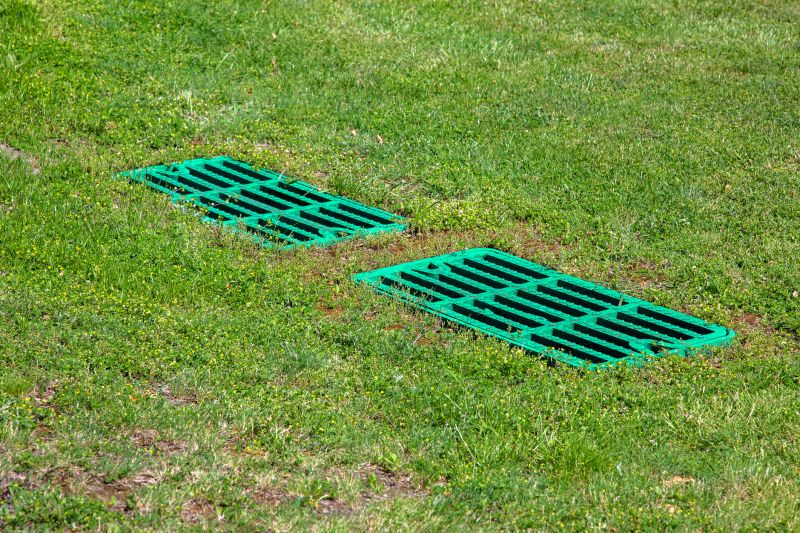Ultimate Collection Of Drainage Installation Items For Any Project
Get access to a comprehensive selection of drainage products suitable for residential, commercial, and industrial needs.
 Effective drainage installation products are essential for managing water flow around residential, commercial, and industrial properties. Proper drainage helps prevent water accumulation, soil erosion, and potential damage to foundations and landscaping. When selecting drainage products, considerations such as material durability, ease of installation, compatibility with existing infrastructure, and suitability for specific site conditions are crucial. A variety of products are available to address different drainage needs, from surface water management to underground piping systems.
Effective drainage installation products are essential for managing water flow around residential, commercial, and industrial properties. Proper drainage helps prevent water accumulation, soil erosion, and potential damage to foundations and landscaping. When selecting drainage products, considerations such as material durability, ease of installation, compatibility with existing infrastructure, and suitability for specific site conditions are crucial. A variety of products are available to address different drainage needs, from surface water management to underground piping systems.
Top Overall Option
Perforated Drain Pipe System
A perforated drain pipe system is a versatile and widely used solution for subsurface drainage. It consists of flexible or rigid pipes with small holes that allow water to enter and be directed away from problem areas. These systems are often combined with gravel or filter fabric to prevent soil intrusion and clogging. They are suitable for yard drainage, foundation waterproofing, and landscape grading projects, offering reliable water diversion while maintaining soil stability.
Types of Products For Drainage Installations
Perforated Drain Pipes
Flexible or rigid pipes with small holes designed for underground water diversion.
Drainage Gravel and Aggregate
Crushed stones and gravel used to facilitate water flow and prevent pipe clogging.
Drainage Fabric and Filter Cloths
Materials used to line trenches and prevent soil from clogging drainage systems.
Channel Drains and Trench Drains
Surface drainage solutions that collect and direct water away from walkways and driveways.
Surface Water Drainage Systems
Products designed to manage runoff from roofs, roads, and paved areas.
French Drains
Drainage systems involving a trench filled with gravel and a perforated pipe to redirect groundwater.
Sump Pumps and Basins
Devices used to remove accumulated water from basements or low-lying areas.
Stormwater Management Systems
Integrated solutions for controlling and directing stormwater runoff.
Drain Grates and Covers
Protective covers that allow water entry while preventing debris from clogging drainage channels.
Catch Basins
Inlet structures that collect surface runoff and direct it into underground pipes.
Pipe Connectors and Fittings
Components used to join drainage pipes securely and create a continuous system.
Waterproof Membranes
Barrier materials used to protect structures from water intrusion.
Erosion Control Products
Materials such as silt fences and erosion mats to prevent soil displacement during drainage installation.
Drainage Pumps
Portable or fixed pumps used to move water from low areas or sumps.
Overflow Drainage Solutions
Systems designed to handle excess water during heavy rainfall events.
Popular Choices
Widely used for underground drainage, facilitating water movement away from foundations and landscapes.
Commonly selected for gravel trenches and around pipes to enhance water flow.
Frequently chosen to line trenches and prevent soil from clogging drainage pathways.
Popular for surface water management along walkways and driveways.
Often installed to redirect groundwater away from structures or low-lying areas.
Commonly used in basements to remove accumulated water efficiently.
Trending for managing runoff from large paved areas and roofs.
Frequently installed at low points to collect surface water and prevent flooding.
Popular for covering drains while allowing water entry and debris exclusion.
Essential components for creating continuous drainage pipe networks.
Often used to protect foundations from water intrusion during drainage installation.
Selected for stabilizing soil during drainage system setup.
Useful for removing water from construction sites or flooded areas temporarily.
Drainage solutions can range from simple gravel trenches to complex modular systems designed for large-scale projects. The right choice depends on factors like the volume of water to be managed, the terrain, and the type of drainage problem encountered. Installing appropriate drainage products can improve property longevity, reduce maintenance costs, and enhance safety by preventing water pooling and related hazards.
Understanding the different types of drainage products and their applications can help property owners and contractors make informed decisions. Whether installing a new drainage system or upgrading an existing one, selecting high-quality components is vital for long-term effectiveness. It is also important to consider local building codes and regulations to ensure compliance and optimal performance of the drainage infrastructure.
Key Buying Considerations
- Determine the volume of water to be managed to select appropriate system capacity.
- Assess soil type and permeability to choose suitable drainage materials.
- Consider the site topography and slope for effective water flow direction.
- Evaluate the compatibility of drainage products with existing infrastructure.
- Select durable materials resistant to corrosion and weathering for longevity.
- Ensure ease of installation, especially if DIY setup is intended.
- Check for compliance with local building codes and regulations.
- Consider maintenance requirements and accessibility for cleaning or repairs.
- Identify the most suitable type of drainage system for surface or subsurface needs.
- Factor in the potential for clogging and choose products with effective filtration options.
- Review the size and dimensions of products to fit specific site conditions.
- Explore modular or expandable systems for future upgrades or larger projects.
- Determine the need for additional components such as connectors, fittings, or covers.
- Estimate the overall project budget, including installation and ongoing maintenance.
- Prioritize products with clear instructions and manufacturer support if needed.
This content contains affiliate links and may earn a commission at no additional cost to you.
